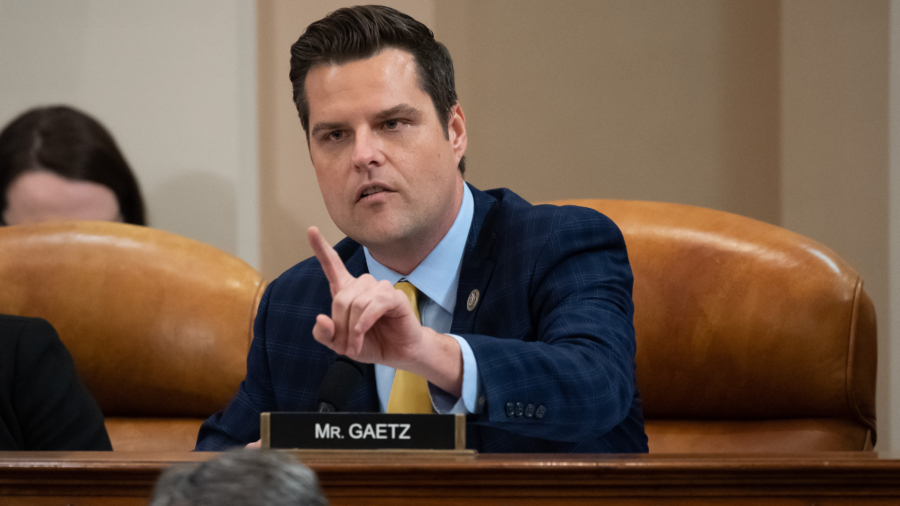House Speaker Kevin McCarthy led his fellow House Republicans in passing a bill on Wednesday that pairs an increase to the U.S. federal debt limit with trillions in future spending cuts. The bill passed mostly along party lines, but four Republicans joined Democrats in opposition to the debt limit arrangement—albeit for different reasons than their Democratic counterparts.
The Limit, Save, Grow Act of 2023 (pdf) passed on Wednesday afternoon by a vote of 217-215. Republican Reps. Andy Biggs (R-Ariz.), Ken Buck (R-Colo.), Tim Burchett (R-Tenn.), and Matt Gaetz (R-Fla.) all voted against the legislation in the final vote.
The bill allows for the United States to add up to $1.5 trillion in additional debt until March 31, 2024, in exchange for spending cuts that Republicans estimated would result in more than $4.5 trillion in savings to American taxpayers. The bill would specifically set annual discretionary spending at Fiscal Year 2022 levels, and would regulate discretionary spending growth to 1 percent annually over the next decade.
The bill would also rescind any unspent pandemic-era relief funds and block President Joe Biden’s plans to forgive trillions of dollars in student debt. The Republican bill would also rescind clean energy tax credits as well as funding increases for the Internal Revenue Service (IRS), which were included in the Biden-backed 2022 Inflation Reduction Act.
While Republicans have called for reining in the national debt, which now stands at about $31.5 trillion, Democrats have claimed that this Republican plan cuts funding to programs used by working-class Americans, seniors, children, and people with disabilities. The Biden administration has argued that lawmakers should raise the federal debt limit without conditions, and has indicated President Biden would veto the Republican debt limit bill if it passes in the Senate.
Biggs
Though Democrats opposed the McCarthy-backed debt limit proposal for cutting spending too much, the four Republicans who joined in opposition to the bill generally criticized it for not cutting government spending enough.
“Whether you drive off a cliff at 60 miles per hour or 80 miles per hour, the end result is the same: a horrific crash,” Biggs said in a Wednesday statement. “That’s what we’re presented with today. The Limit, Save, Grow Act is touted to ‘save’ $4.8 trillion. In reality, it merely reduces the 2033 projected national debt from $52 trillion to around $47 trillion.”
Biggs argued that capping next year’s discretionary spending at Fiscal Year 2022 levels is not an aggressive enough plan. He said that “at the bare minimum, this legislation should have returned federal spending to FY 2019, pre-COVID levels, which would allow us to spend within our means.”
Buck
In his own statement, Buck credited McCarthy’s plan as “a step in the right direction”—but said the Limit, Save, Grow Act still “does not do enough to rein in the federal government’s reckless spending.”
Burchett
Burchett specifically faulted McCarthy’s debt-limit plan for not providing a balanced budget, with government expenses not exceeding revenues.
“We need to do whatever is necessary to get back to a balanced budget and meaningful debt reduction so this issue doesn’t keep coming back to haunt us,” Burchett said in a statement on Wednesday.
Burchett has opposed the idea of raising the debt limit altogether. “I have never voted to raise our debt limit no matter who was in charge,” he said.
Gaetz
Like Burchett, Gaetz said he has consistently voted against debt limit increases over the years.
“While I applaud the work of my Republican colleagues to demand better energy policy, regulatory reform, welfare-to-work requirements and less spending, a troubling fact remains,” Gaetz said Wednesday. “This plan will increase America’s debt by $16 trillion over the next ten years. Gaslighting nearly $50 trillion in debt to America is something my [conscience] cannot abide at this time.”
Gaetz also criticized how the Limit, Save, Grow Act changed in the hours leading up to Wednesday’s vote, saying “Congress shouldn’t be making final changes at 2 a.m.—the morning of the vote—to legislation raising the debt limit $1.5 trillion.”
What Comes Next
The Limit, Save, Grow Act faces tougher odds of passing in the Democrat-controlled Senate.
While this specific Republican bill may not go any further, it could help Republicans force Biden to negotiate on the debt limit and government spending to avoid defaulting on the debt. The U.S. has never defaulted on its debt, but the time for avoiding such an outcome is running out, with a default projected to occur as early as July if a solution is not found.
“At some point President Biden is going to do what he’s always done in the past, which is get in the room and negotiate,” Rep. Dusty Johnson (R-S.D.) told NPR on Tuesday.
Several Democratic lawmakers have also signaled that they won’t stand by Biden’s calls for an unconditional debt limit increase.
“Our elected leaders must stop with the political games, work together and negotiate a compromise,” Sen. Joe Manchin (D-W.Va.) said last week. “Instead, it has been more than 78 days since President Biden last met with Speaker McCarthy. This signals a deficiency of leadership, and it must change.”
In an interview with CNN on Sunday, Sen. Amy Klobuchar (D-Minn.) said, “Of course President Biden should sit down with Speaker McCarthy” to negotiate on the debt and spending.


